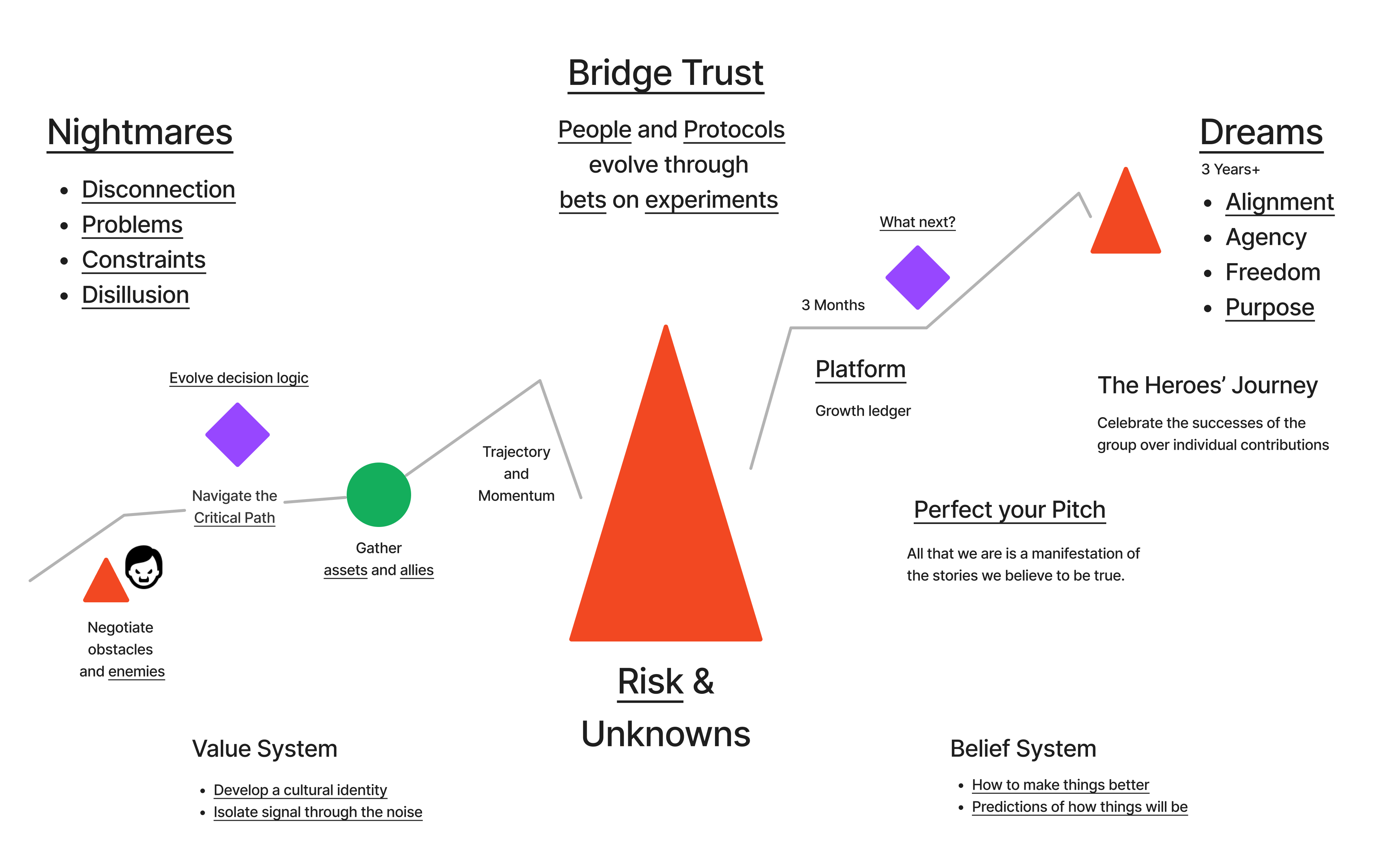The Game of Life
All the world's a stage, and all the men and women merely players, they have their exits and their entrances, and one man in his time plays many parts.
Games are designed to frustrate players, forcing them to adapt by learning new systems and rules, which builds transferable skills for the real world. For information to be valuable it needs to be understandable and actionable. Game provide a system to explore your own learning curve at a rate the maintains a flow state.
The Hero's Journey
Playing games builds confidence you can adapt to challenging situations. How would you make a game that helps with experiencing taking one-way decisions?

Everyone is living their own version of The Heroes Journey story arc.
- Search for Meaning
- Manage Time and Energy
- Learn to Learn Independently
- Build Trusted Connections
- Negotiate Enemies
- Evolve exercise routines
- Establish healthy sleep habits
- Match diet to your body chemistry
- Find Your Identity
- Develop Your Brand
- Navigate Sex
- Navigate Drugs and Alcohol
- Earn a Living
- Manage your Money
- Buy a home
- Vote for Direction
- Travel the World
- Find a Life Partner
- Lead a Community
- Run a Business
- Raise a family
- Switch Careers
- Invest in Property
- Invest in People
- How to retire
- The Endgame
Explore Potential
Start with a clear picture of desired outcomes and work backwards to picture overcoming obstacles on the critical path to success.

- Define Success: Clarify your expectations using an Outcome Map. This helps align the team and stakeholders on the goal and contributing factors.
- Visualize the value stream: Create Value Stream Maps to visualize and measure the current, ideal, and target state workflows. This helps identify constraints and prioritize opportunities.
- Map dependencies: Use a Dependency Map to identify external factors affecting the team's performance and target dependencies to break or mitigate.
- Assess team capabilities: Create a Capability Map to understand internal factors affecting performance and identify areas for skill development or resource allocation.
- Prioritize improvements: Use the insights from all maps to create a prioritized list of initiatives, considering factors like impact and effort.
- Involve key stakeholders: Include representatives from all parts of the value stream in the mapping process to ensure diverse perspectives.
- Use collaborative tools: Leverage shared visual board tools for real-time collaboration during mapping sessions.
- Iterate regularly: Repeat the mapping process every 3-6 months to reassess progress and set new targets.
- Focus on qualitative measurement: Remember that qualitative measurement is often more valuable than purely quantitative metrics.
- Consider external facilitation: A skilled, outside facilitator can bring unbiased perspective and efficiency to the mapping process.
- Start with estimates: When beginning, relative measurements and team estimates are often sufficient to identify major bottlenecks and opportunities.
- Communicate visually: Use maps and visual representations to share understanding across different levels and departments in the organization.
- Connect improvements to outcomes: Ensure that all improvement efforts are clearly linked to the desired outcome defined in the Outcome Map.
Better Maps Better Decisions
Make the journey easier for others to follow.
Education
So much to learn in a rapidly changing world, it is very challenging to identify what knowledge and capabilities will be valuable to society.
Career and Financial
People often experience fear when facing major career and financial decisions. This includes:
- Fear of career repercussions leading to underperformance
- Fear of making the wrong financial investment
- Fear of starting a new business or changing careers
- Fear of not having enough resources (scarcity mindset)
These fears can paralyse decision-making or lead to overly cautious choices that limit potential growth and opportunities.
Interpersonal Relationships
Decisions involving relationships often trigger strong emotional responses:
- Fear of rejection leading to avoidance of social situations
- Fear of commitment in romantic relationships
- Fear of confrontation causing unresolved conflicts
These fears can result in isolation, missed opportunities for connection, or prolonged unhealthy relationships.
Health Optimisation
Fear can significantly impact health-related decision-making:
- Fear of receiving bad news can prevent people from seeking medical care
- Fear of side effects may lead to avoiding necessary treatments
- Fear of lifestyle changes required for better health
This avoidance behavior due to fear can result in worsened health outcomes over time.
Major Life Changes
Significant life transitions often evoke fear and anxiety:
- Moving to a new city or country
- Getting married or divorced
- Having children or deciding not to have children
The uncertainty associated with these changes can create decision paralysis or rushed choices made out of fear rather than careful consideration.
Past Traumas or Mistakes
Confronting past experiences or errors can be emotionally challenging:
- Fear of reliving traumatic events
- Fear of acknowledging and learning from past mistakes
- Fear of being judged for past actions
This fear can prevent personal growth and healing, as well as limit future decision-making abilities.
Risky or Uncertain Situations
Fear significantly influences risk assessment and decision-making in uncertain scenarios:
- Overestimating risks and dangers
- Overvaluing interventions meant to protect from perceived threats
- Making decisions based on emotional rather than rational assessments